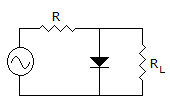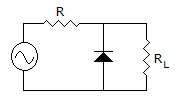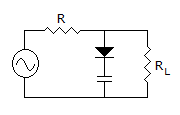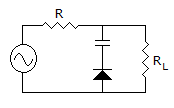Discussion
Home ‣ Electronics and Communication Engineering ‣ Matching Questions See What Others Are Saying!
- Question
Match the following:
List I List II A. 
1. Negative limiter B. 
2. Positive Limiter C. 
3. Biased negative Limiter D. 
4. Biased positive limiter
Options- A. A-1, B-2, C-3, D-4
- B. A-2, B-1, C-4, D-3
- C. A-2, B-1, C-3, D-4
- D. A-1, B-2, C-4, D-3
- Correct Answer
- A-2, B-1, C-4, D-3
- 1. The characteristics of which device has peak point and valley point
Options- A. SCR
- B. PUT
- C. SCS
- D. Shockley diode Discuss
- 2. Schrodinger wave equation is partial differential equation.
Options- A. True
- B. False Discuss
- 3. The output frequency of a cycloconverter can be changed by changing the firing angle.
Options- A. True
- B. False Discuss
- 4. Most of the memory chips in static RAM
Options- A. do not require any supply
- B. need 2 V supply
- C. need 5 V supply
- D. need 12 V supply Discuss
- 5. In crystalline solids, atoms are stacked in a regular manner.
Options- A. True
- B. False Discuss
- 6. The classes of solid dielectrics are
Options- A. A, B, C, D, E, F, H
- B. A E B F H C D
- C. Y A E B F H C
- D. A E B F H C Discuss
- 7. The unit for mmf is
Options- A. A
- B. Wb
- C. T
- D. V Discuss
- 8. In a single phase full wave regulator, the firing angles in the positive and negative half cycles are generally
Options- A. equal
- B. different
- C. equal or different
- D. different but sometimes equal Discuss
- 9. The real part of complex dielectric constant and tan? for a dielectric are 2.1 and 5 x 10-4 at 100 Hz respectively. The imaginary part of dielectric constant at 100 Hz is
Options- A. 1.05 x 10-3
- B. 2.1 x 10-3
- C. 5 x 10-3
- D. 1.05 x 10-2 Discuss
- 10. The units for ?r are
Options- A. Farads
- B. Farads/m
- C.

- D. no units Discuss
More questions
Correct Answer: PUT
Correct Answer: True
Correct Answer: False
Correct Answer: need 5 V supply
Explanation:
Digital chips need 5 V supply.
Correct Answer: True
Correct Answer: Y A E B F H C
Correct Answer: A
Correct Answer: equal
Explanation:
Firing angles are kept equal to get symmetrical output voltage.
Correct Answer: 1.05 x 10-3
Explanation:

Correct Answer: no units
Explanation:
?r is only a numeric. Hence no units.
Comments
There are no comments.More in Electronics and Communication Engineering:
Programming
Copyright ©CuriousTab. All rights reserved.
